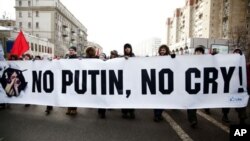Russia’s political protest movement has been in hibernation since Christmas. Winter still holds Moscow in its grip. But, columns of protesters, both for and against Prime Minister Vladimir Putin, emerged from their warm apartments Saturday to protest on the frozen streets.
Across the frozen Moscow River from the Kremlin, protesters chanted Saturday: “Russia without Putin.” But, down a few bends in the river, supporters of Prime Minister Vladimir Putin waved signs reading “Enough of Revolution” and “Our President is Putin.”
Despite Arctic temperatures, Russia’s political climate heated up Saturday, one month before Russia’s presidential election.
Pro-Putin and anti-Putin forces held mass rallies. Opposition leaders said over 100,000 people attended the anti-Putin gathering. Moscow police said 138,000 attended the pro-Putin rally.
Similar dueling rallies, with lesser crowd numbers, were held across the nation in about one dozen cities.
For the opposition, it was a test of strength, showing that, after a winter holiday break, the movement for democratic reforms is still strong.
Sergei, a 56-year-old insurance worker, said he was impressed with the opposition crowd as he surveyed red-nosed demonstrators, bundled in parkas, scarves, gloves and heavy winter boots.
He said that Russia’s leaders cannot close their eyes to the fact of a massive turnout.
Converging on the rally site by subway, the anti-Putin crowd was a diverse mix of nationalists, communists, liberals and anarchists. The common refrain was the desire for clean presidential elections on March 4, followed by a more open political system.
Standing on a pile of snow, Gregory Kataev, a filmmaker, said he was happy to see such a turnout when the temperature was minus 20 degrees.
"If I want a better Russia, if I want it to be a democratic country, I have to do something, not only speaking in the kitchen, as we say in Russia," he said.
Opposition politicians say that the ruling United Russia party stole 1 million votes in Moscow in the December 4 parliamentary vote. At the rally here, people with clipboards signed up volunteers to monitor the March 4 Presidential elections.
Lyuba, a 25-year-old social worker, says she is here because her vote was stolen in December.
Elena Gaber, a 20-year-old political science student, came with friends. She said the parliamentary election fraud shocked her generation, and made it politically active.
She predicted that the movement will continue after the presidential vote, building institutions that will chip away at Russia’s authoritarian system.
“I think it is very important to build civil society," she said.
Five kilometers away, at the same time, a similar mass of demonstrators turned out to support Mr. Putin.
They waved signs reading: "Who is for Putin, is for Russia." And "If not Putin, who?"
Many demonstrators arrived by bus. Earlier this week, Moscow media outlets and a human rights hotline received dozens of complaints from government workers saying they were being pressured, or paid, to attend the pro-Putin rally.
The rally was billed as "anti-Orange" - an attempt to link Russia’s opposition with the anti-government Orange Revolution that took place seven years ago in Ukraine.
Nikolai Storikov a Moscow publicist, pounded on the theme that foreign forces are guiding Russia’s anti-government protests.
He told the attendees to support Mr. Putin, who has no contact with “the Orange freaks” or the Americans.
But the opposition protests have already made one concrete change: state television repeatedly aired reports from both rallies. The coverage of the anti-Putin rally artfully avoided showing attacks on Mr. Putin, Russia’s political strongman for the last 12 years.
Before trooping home in the snow, the opposition protesters chanted repeatedly: “Russia Will be Free.”
Pro- and Anti-Putin Rallies Draw Mass Turnouts in Moscow
- By James Brooke




